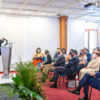
The jobs of the future and the skills they will need should keep us awake at night. Today six out of 10 employers do not find in young candidates the necessary skills to hire them, according to ManpowerGroup. Time will only show the problem: By 2030, more than 100 million workers will need a different occupation than they do today, according to McKinsey.
“The most disadvantaged workers will have the most complex job transitions, in part because their current jobs were the most affected by covid-19,” adds McKinsey, and of course, they are the ones with the lowest incomes.
With this in mind, Kim Wilcox, president of the University of California (UC) Riverside, will visit Mexico next week. The objective is to strengthen ties with Mexican academic institutions and promote Alianza MX to build fairer societies in Mexico and the United States (EU).
“Universities have a central role, due to the polarization that exists and the questioning of science, to bring together different actors and ensure that research responds to society’s most complex problems and challenges,” Isabel Studer, director of MX Alliance.
Alianza MX unites three existing programs between UC and our country: UC Mexus, UC-Mexico Initiative and Casa de California, which already collaborate with Conacyt, UNAM, IPN, CINVESTAV and another 100 research centers in Mexico.
One area of opportunity, Isabel told me, is the academic mobility of students and professors. “Student exchange could develop a circular workforce serving California and Mexico.”
But there is a barrier: English. That is why in the list of countries with the greatest academic mobility towards the United States, Mexico is placed in the ninth place, “which is very surprising because we are the most important commercial partners,” Isabel told me, adding that we need not only to speak English, but also to be able to face professional discussions between engineers or about robotics and data analysis.
The thematic list of Alianza MX wants to promote joint research and cooperation that translates into economic development and includes: climate change, migration and inequality, gender, transportation electrification, water, food security and urban planning. For Isabel, the fact that collaborative science innovates and solves current problems does make it possible to reduce polarization and boost economic growth.
Innovation, technology, scientific knowledge together with skills such as resilience, problem solving and critical thinking are and will be key. For Mexico it is not too late, but the accelerator must be stepped on.



